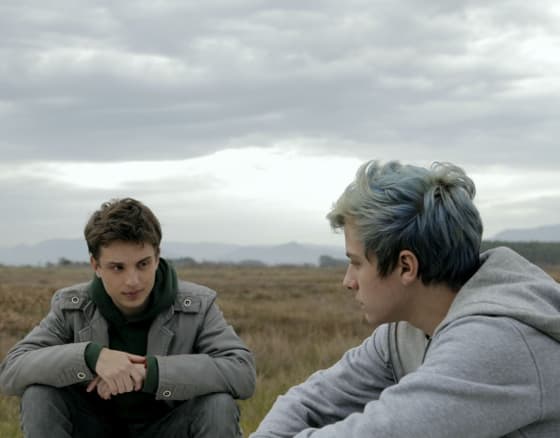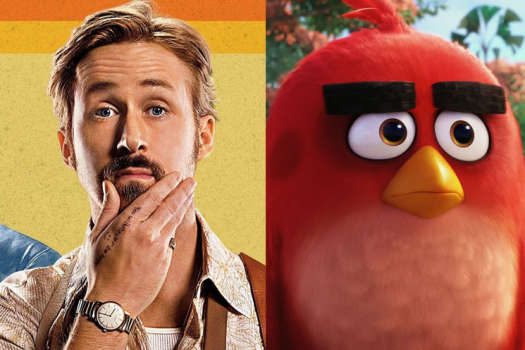At first glance, there really isn't much to Filipe Matzembacher and Marcio Reolon's feature directorial debut, Seashore. It's a mostly observational and voyeuristic tale of the sexual coming-of-age between teenaged best friends, Martin (Matheus Almada) and Tomaz (Mauricio Barcellos), and it follows a very predictable trajectory.
Traveling to his seaside home to take care of some family business, Martin brings along the more reserved and effeminate Tomaz, a friend from whom he's been somewhat estranged of late. The pair mostly loaf about playing video games when Martin isn't alienating a local family with whom his ethically questionable father has business dealings or arranging binge-drinking sex parties. Matzembacher and Reolon detail the few actions that occur with excess close-ups, often scrutinizing Tomaz's pointed gaze at his otherwise preoccupied friend.
In many ways, this is a movie about the gaze. While Tomaz's eyes always fall firmly on Martin's physique, Martin expresses more of an interest in someone older and more masculine nearby. These desires are never really articulated — Tomaz does tenuously open up to Martin later in the film, but the constant focus on eyeline matches and peeping is consistent throughout Seashore.
These subtleties are quite intentional. Early on, there's an anecdote from Martin recounting a rather upsetting tale of abuse involving the raising of a blue flag, which comes back later in the film, indirectly, when Tomaz takes a dare to dye his hair blue. The colour is used as a testament to simultaneous freedom and embarrassment, representing open sexual curiosity as much as the painful memory of the shame Martin's father imposes on him. Similarly, while there's a hint at an underlying romantic triangle conflict, Matzembacher and Reolon aren't interested in exploiting it for dramatic effect; they merely introduce it as a factor and allow everything to pan as Martin and Tomaz grow closer.
In some ways, this restrained style is commendable. A lot is left open to interpretation, and the ending leaves us only with a symbolic idea of how to interpret the events preceding. But it also doesn't take any risks or play with a format that is pretty well worn and familiar when it comes to coming-of-age terrain. This may stem from the source material; the directors actually based this film on their own experiences living near the same beach but never befriending each other in their youth. It's possible their closeness to the material and hesitance to acknowledge less flattering aspects about themselves hold this story back. But this motivation also means it's possible that this text could be more of a riddle than it initially seems.
Either way, Seashore does have some interesting observations about the unspoken nature of nascent desires. It's true that some of the visual tactics used — video game play is filmed from waist up to make it appear that the boys are masturbating together — are a tad trite, but the basic contemplative style is quite effective. Matzembacher and Reolon do have a vision that could develop quite nicely with more experience. And as a debut, Seashore is definitely nothing to scoff at.
(Avante)Traveling to his seaside home to take care of some family business, Martin brings along the more reserved and effeminate Tomaz, a friend from whom he's been somewhat estranged of late. The pair mostly loaf about playing video games when Martin isn't alienating a local family with whom his ethically questionable father has business dealings or arranging binge-drinking sex parties. Matzembacher and Reolon detail the few actions that occur with excess close-ups, often scrutinizing Tomaz's pointed gaze at his otherwise preoccupied friend.
In many ways, this is a movie about the gaze. While Tomaz's eyes always fall firmly on Martin's physique, Martin expresses more of an interest in someone older and more masculine nearby. These desires are never really articulated — Tomaz does tenuously open up to Martin later in the film, but the constant focus on eyeline matches and peeping is consistent throughout Seashore.
These subtleties are quite intentional. Early on, there's an anecdote from Martin recounting a rather upsetting tale of abuse involving the raising of a blue flag, which comes back later in the film, indirectly, when Tomaz takes a dare to dye his hair blue. The colour is used as a testament to simultaneous freedom and embarrassment, representing open sexual curiosity as much as the painful memory of the shame Martin's father imposes on him. Similarly, while there's a hint at an underlying romantic triangle conflict, Matzembacher and Reolon aren't interested in exploiting it for dramatic effect; they merely introduce it as a factor and allow everything to pan as Martin and Tomaz grow closer.
In some ways, this restrained style is commendable. A lot is left open to interpretation, and the ending leaves us only with a symbolic idea of how to interpret the events preceding. But it also doesn't take any risks or play with a format that is pretty well worn and familiar when it comes to coming-of-age terrain. This may stem from the source material; the directors actually based this film on their own experiences living near the same beach but never befriending each other in their youth. It's possible their closeness to the material and hesitance to acknowledge less flattering aspects about themselves hold this story back. But this motivation also means it's possible that this text could be more of a riddle than it initially seems.
Either way, Seashore does have some interesting observations about the unspoken nature of nascent desires. It's true that some of the visual tactics used — video game play is filmed from waist up to make it appear that the boys are masturbating together — are a tad trite, but the basic contemplative style is quite effective. Matzembacher and Reolon do have a vision that could develop quite nicely with more experience. And as a debut, Seashore is definitely nothing to scoff at.




